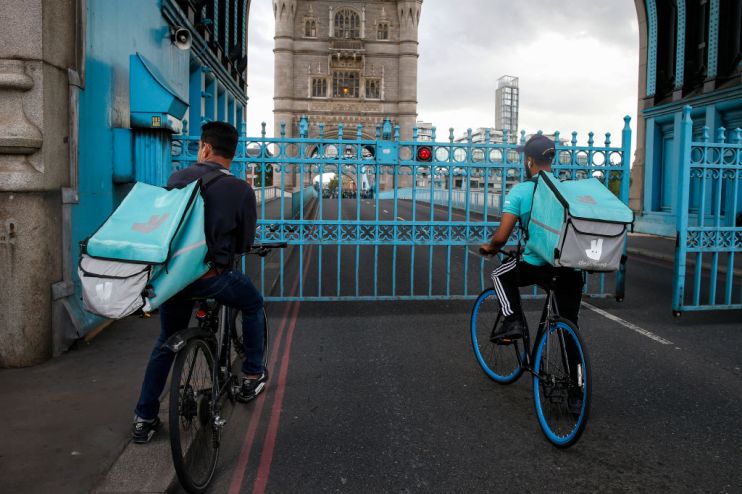Deliveroo float under fire as major investors balk at workers’ rights row

Deliveroo’s blockbuster stock market float is under pressure after a string of high-profile investors said they will steer clear of the IPO due to the way the company treats its workers.
Legal & General Investment Management and M&G today became the latest institutional investors to announce they will not take part in the delivery giant’s £9bn initial public offering due to uncertainty over workers’ rights and potential employment law cases.
It comes after BMO Global, CLLA, Aberdeen Standard and Aviva Investors also revealed their opposition to the float.
Deliveroo, which is already under scrutiny over the way it treats workers, could face a challenge over how it classes its riders after a landmark Supreme Court ruling forced Uber to grant its drivers worker status.
Labour law expert Alan Bogg said he had “little doubt” that Deliveroo riders would be treated as workers if the company faced a legal challenge over the issue.
Tom Powdrill, head of stewardship at pension fund adviser PIRC, also issued a warning to investors, saying any challenges to the company’s employment model were “financially material”.
BMO today went further, describing the employment issue as a “ticking time bomb” that made the company “uninvestable”.
A Deliveroo spokesperson said: “Deliveroo has received very significant demand from institutions across the globe. The roadshow began on Monday and the deal was covered by demand across the full price range by the end of the first morning.
“Demand has continued to build since then, including via our community offer, and we look forward to welcoming new shareholders next week alongside our currently highly respected existing investors.”
It comes as new figures published today revealed many of Deliveroo’s riders are paid less than the minimum wage.
An analysis of thousands of invoices found one in three delivery workers made less than £8.72, the national minimum wage for over-25s.
Despite Deliveroo’s claims that riders are paid more than £10 an hour on average, some were found to earn as little as £2 an hour.
The damning figures, compiled by the Bureau of Investigative Journalism, will cause a further headache for the company in the run-up to its bumper stock market debut.
Deliveroo, which employs more than 100,000 riders across 12 countries, has previously resisted reform, arguing that classing its riders as workers would incur significant additional expenses or even result in it exiting the market.
But the outcome of Uber’s long-fought legal battle could now pose a fundamental threat to the wider gig economy.
In response to the analysis of pay, a spokesperson said: “Deliveroo riders have the complete freedom to choose when and where to work and can choose which deliveries to accept and which to reject.
“50,000 riders choose to work with Deliveroo, and thousands more people apply to work with us every week. Our way of working is designed around what riders tell us matters to them most – flexibility. Riders in the UK are paid for each delivery they choose to complete and earn £13 per hour on average at our busiest times.”